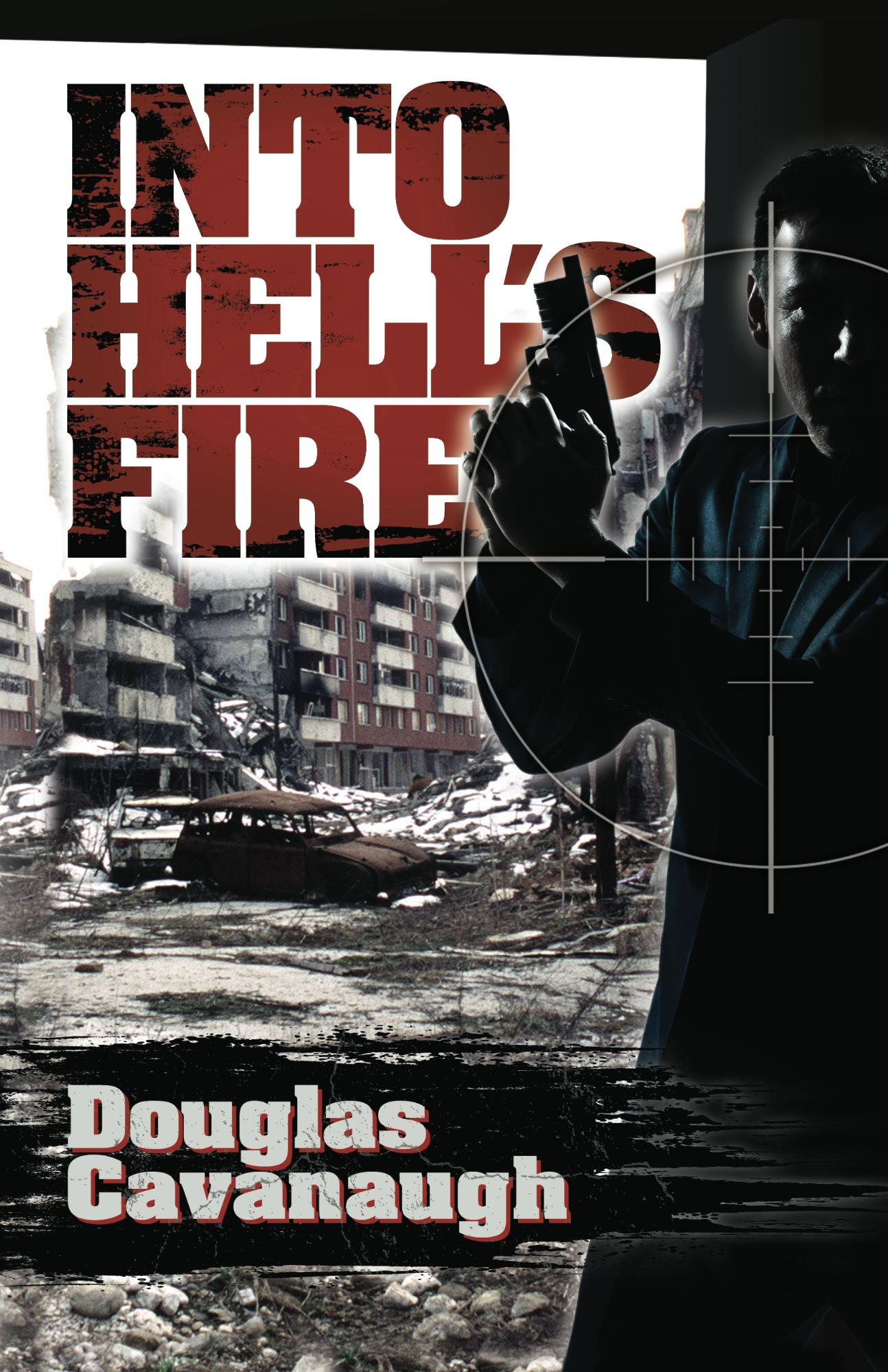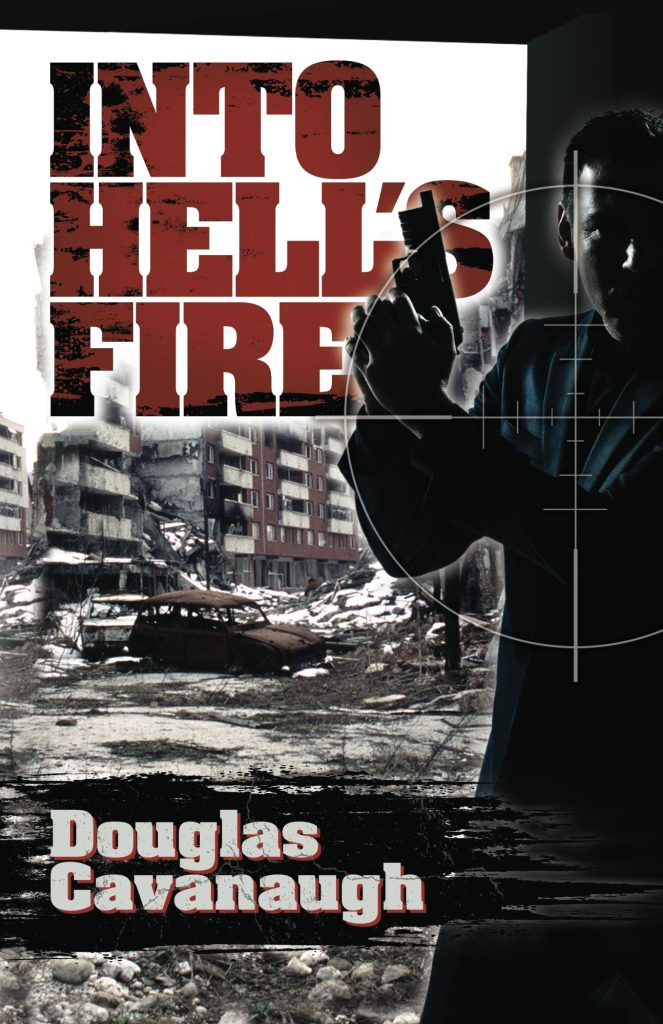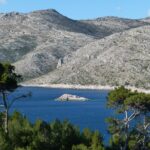One of my favourite things about working for TCN is getting to meet interesting individuals from all walks of life who I probably wouldn’t get to know otherwise. A couple of months ago, we were contacted by Douglas Cavanaugh, an American expat who has been living in Croatia for over 20 years. Close to the end of his email, he mentioned he had written a novel of the action/thriller genre set in Bosnia and Croatia in the early 90s, and while he’s had multiple positive reviews from the US and the UK, he was keen on having someone from these parts take a look and share their thoughts.
Upon learning Douglas was based in Rijeka, I reached out to him and arranged a meeting. He was kind enough to gift me a paperback copy of his novel, and even though it took me a while to get around to reading it (sorry, Douglas), I ended up finishing the book in a span of several days.
Into Hell’s Fire is a fast-paced thriller with a suspenseful plot that unfolds amidst the Bosnian War and the Croatian War of Independence. Lucas Martin, a Croatian-born retired agent of the US government, is recalled to duty and deployed to Sarajevo during the siege in 1992 as an informant to Washington. While he was originally meant to monitor the state of affairs and accumulate intelligence, he soon crosses paths with a malicious general and gets entrapped in a dangerous game of life and death.
To any reader unacquainted with devastating events that followed the breakup of Yugoslavia, the synopsis above might read like a typical political thriller. However, people who have lived through the war or grew up in its aftermath are likely to have an intense emotional response to the matter at hand, and a work of fiction penned by a foreign author might very well provoke a heated reaction. I think it’s fair to say we’re not that keen on foreigners disclosing their opinions on the war, having heard enough platitudes and ignorant remarks for a lifetime, and I was curious to find out how the author decided to tackle the subject.
I’ll be honest and say I wasn’t only impressed, but also a bit surprised by how objectively the story was framed. As Douglas later told me, Into Hell’s Fire is purely a work of fiction; he didn’t set out to write a documentary account of the war nor offer any sort of political commentary. His neutral stance is well reflected in the novel: there’s no biased argumentation, no side glorified at the expense of others, and the relevant historic events are presented as a sort of backdrop for the central storyline. That said, those events are in no way trivialised or reduced to banal scenery – instead, the factual account on display serves to show how greed and aggression sent multiple nations spiraling into an abyss of destruction, despair, and inconceivable suffering. Regardless of our individual points of view or personal experience, I think we could all agree on that.
While Douglas stated the novel is ‘by no means a masterpiece’, I think he’s selling himself short, as he managed to create an outstandingly vivid, engaging story and handled a sensitive subject in a tactful manner. Seeing that I had an opportunity to discuss the matter with the author himself, I followed up with Douglas to find out more about his personal background, his view of his adopted country, and his writing process.

You’ve been living in Croatia for more than 20 years. What pushed you to make the big decision in the first place, and were you originally planning to stay in Croatia indefinitely?
I finished my chiropractic university in early 1990. Afterward, I lived in two different rural communities in my homestate of Iowa. Iowa is a wonderful state, but a quiet one, and living in a small town there can be quite boring. At that stage of my life, I was free to see the world. That’s when some opportunities to travel abroad presented, first to the United Kingdom in 1992, and then later to southeast Asia in 1995. I enjoyed both experiences immensely and the idea of working overseas became very appealing.
Soonafter, I received a telephone call from a colleague and former university classmate, Dr. Warren Russell, who had worked in Rijeka, and later in Zagreb, for nearly three years. He had been contacted by a polyclinic in Rijeka searching for a legitimate, university-trained chiropractor and put me in contact with the director. Like most Americans at the time, I wasn’t too familiar with the newly-formed Republic of Hrvatska. I didn’t know much about it except for the evening news reports about the war that had taken place prior to my arrival in 1996. In retrospect, I was not originally planning to stay in Croatia back then. At the time, I saw the experience more as an adventure and a stepping stone to bigger things. But life has a funny way of changing one’s plans.
You moved to Croatia in 1996. What was your original impression of the country in those sensitive post-war years? How would you describe the changes to the Croatian society and everyday life in the last two decades?
Life in Croatia has improved in many ways since 1996. And in many other ways, it hasn’t changed at all. In that regard, it is a bit of a paradox. My original impressions in 1996 were that the country was likeably outdated. It was a pretty stressful time for most people when I arrived in 1996, and the effects of the stress on the general public was eye-opening. Yet I had a lot of good times back then. There was kind of a ‘wild west’ atmosphere in place. Rules were in established but not really followed. Concerning the changes to the Croatian society and everyday life in the last two decades, again, the former paradox comes back into play. Everyday I can see physical changes currently underway or that have taken place (i.e. new airport and buildings, roads, tunnels and infrastructure; modern stores, markets, and businesses). On the other hand, while listening to the locals talk about politics and the economy, I’m often disappointed how the conversation has changed so little over the same time span. Like the old saying, “The more things change, the more they stay the same.“
Can you tell us a couple of pros and cons of living in Croatia, from an expat’s perspective?
From an expat’s perspective, first and foremost, the language issue should be addressed. The hrvatski language can be a barrier for many foreigners, even those who are enthusiastic about learning a new language. Thankfully, many if not most Croats are multi-lingual and willing to communicate in their non-native language. But that mostly applies to social occassions. Many other instances for expats living full-time in Croatia may occur where they’ll need to deal with workers, majstors, bureaucrats and other examples where they’ll be at a major disadvantage if they don’t learn basic hrvatski.
Some pros to living in Croatia: a relaxed lifestyle is in play, it’s a relatively inexpensive country as compared to others in the EU (but not for everything), it’s well-positioned location-wise within Europe, and there’s a wide variety of interesting places to visit both inland and near the sea.
Some cons that I notice: Croats place a much different value on time than people from many western countries. They aren’t opposed to wasting their time or yours. There is a wide range of work ethic and workmanship among Croat workers, and an even wider spectrum among management. Some locals do have a good work skills because it came naturally to them, not because it was trained on the job. Tied to these points is the fact that Croatia has a massive ‘café culture.’ It was appealing to me when I was younger. Now that I’m older, I see it as a curse.
What I like in particular about Croatia is that there is a lot to do as a family. Hiking trips (both organized and unorganized) and other excursions, the summer swimming season on the Adriatic Sea, plenty of nature to enjoy. Some of our best times are Sunday afternoon lunches with friends and their families in local resaurants or Istrian konobas.
The plot of your first novel, Into Hell’s Fire, is centered around a Croatian-American protagonist who finds himself in Sarajevo during the siege in 1992. The Croatian War of Independence was also going on at the time, and parts of the plot take place in Croatia as well. What inspired you to write the story?
I’d always wanted to try to write a novel since reading became a hobby of mine while living in Iowa. However, a good subject for a plot never caught my attention until I moved to Croatia.
As for what inspired me, I was spending a lot of time on international flights in the late 1990s and passed much of the transit time reading novels. As a result of finishing too many highly-praised books which I personally felt were undeserving; I set out to write an action/thriller novel that could equal or surpass those that I felt didn’t measure up. I won’t name names, but more than a few were written by well-established, big name authors in the same genre. Whether I achieved my goal or not isn’t for me to say. That will be left to readers of Into Hell’s Fire to decide.
Which came first – the setting or the plot?
I have to say they arrived spontaneously and simultaneously. It happened like this:
Into Hell’s Fire was conceived on an overnight ferry trip I took with my parents from Rijeka to Dubrovnik in 1997. Sometime on a warm, summer afternoon, my father and I were sharing a beer on the ferry’s open deck and absorbing the sun. Since the war had ended less than eighteen months earlier, there were still quite a few NATO and U.N. personnel active in the area. On that particular journey, a man dressed in all black and wearing dark sunglasses was seated nearby. He was alone and spent a lot of time speaking in several different languages to several contacts using a cumbersome, early model mobile phone, probably via a satellite connection, I speculated. Though I couldn’t understand any of what was being discussed, out of curiosity, I eavesdropped sporadically on his conversations. I had no idea who this man was – he could have simply been a tour guide or a ferry company official for all I knew, but it did get my imagination working. Who was this guy? Who was he talking to? Why was he speaking in so many languages? Who was he working for? Readers will definitely pick up on this detail at some point when reading the book. After splitting another beer, the genesis of Into Hell’s Fire’s plot emerged. That detail stayed in my mind for another six years until I finally started writing the book.
The early 1990s were a complex, turbulent period, to say the least, and you’ve done a splendid job of presenting the course of events in a fairly objective manner. You also set a part of the story in the 1940s. How did you go about the research required to write the book?
It is important to note that my book is a complete work of fiction versus a documentary or historical account of the war. Having said that, there are many portions of the story, of course, where the details are sketchy, embellished, or only relatively accurate.
Some of my main research was done as recreational reading before I even considered writing my book. Two books in particular were very helpful: Blood and Vengeance by Chuck Sudetic, and Tito and the Rise and Fall of Yugoslavia by Richard West.
A far more important source of information came to me through personal conversations with two Croatian friends of mine who participated in Croatia’s War of Independence. My plot was enriched through the suggestions of Ervin Katalinic (Rijeka) who is an avid reader of novels written in English. My most reliable technical information came to me through my very close friend Dimitry Vaseljev (Rijeka). I like to say that before the world had the internet, it was fortunate to have Dimitry Vasiljev. To me, it seems as Dimitry has a photographic memory and total recall which is especially amazing now that he is in his early eighties. His knowledge of military weaponry and tactics is legendary, and my frequent conversations with him left me amazed on the variety of subjects which he has in his command. I’ve been really blessed to have Dimitry as a friend.
The last piece of vital research came to me through my own eyes, ears, memory, and imagination. Of the many settings throughout Bosnia and Croatia featured in Into Hell’s Fire, I personally visited each one during the writing process and took notes and pictures as I traveled.
Since writing is not your primary profession and Into Hell’s Fire being your first novel, could you share a couple of thoughts on your writing process? When did you find the time, and how long did the project take to finish?
I am proof that anyone can write a novel who has time management skills, persistence, a good imagination, and solid ability to write at a basic level. It all comes down to those four factors and missing any of those mentioned will prevent the task from being completed.
I have a wife and daughter, a full-time job, and a few other projects which take up most of my free time. Yet the urge to write never escapes me and I try to devout as much time as I can to write. Mostly that happens between patients at work or on the rare occassions I manage to arrive at my office an hour earlier than usual. I tend to write in short segments rather than in long stints at the computer.
Into Hell’s Fire was written entirely in Croatia. It took eight years from when the first word was typed to the final edit was completed. About the time I finished, self-publishing was going mainstream. No agents, no publishers required. In hindsight, I am happy to have chosen that avenue. However, since the book is written in English, it has been difficult to promote within Croatia, though the market of English-reading Croats may be larger than I presume. Fortunately, the world’s largest internet book retailer has outlets worldwide and my book is available there in both paperback and eBook reader formats. Into Hell’s Fire has been a big hit with expats, tourists, and Croats living abroad, and has been bought and read by people in eleven different countries.
Glad to hear that. Are you planning to write another novel in the future? Any projects you’re currently working on?
When I finished writing Into Hell’s Fire, I was burned out to the point where I decided I wasn’t going to write another novel. I decided to return to reading rather than writing and that’s what I did for two years. Then out of nowhere, an idea popped into my head that I thought would make a good plot for a novel. Since I had a much better idea of the process, I started writing again. The book I’m working on now is much longer and I’ve cut the writing time in half. I am now eighty percent finished and hope to have the final product ready by Christmas 2018. Ironically, the new book is primarily set in Iowa rather than Croatia. One of the main characters is a Croatian-American whose great grandfather migrated to the U.S. a century earlier.
A full circle, so to speak. One more thing: I’m fairly certain all readers tend to visualise every story as it unfolds, and we often rely on the Hollywood pantheon to picture the characters. Just out of curiosity, did you ever think about who would play Lucas in a movie?
Considering that Lucas Martin, the Croatian-American protagonist in Into Hell’s Fire, is fifty-five years old and my book was started in 2003, any actor I may have considered at that time would be far to old for the role these days.
If the book were ever fortunate to be considered to be made for the big screen, and if I had a say as to who might portray Lucas Martin, I think Russell Crowe could provide a level of seriousness the role requires. He would be a solid choice. Sean Penn might be able to provide a level of intensity that might work, too. I think both are in their mid-fifties.
As you said, life has a funny way of intervening, so you never know when a certain producer might pick up the book… In the meantime, thanks for sharing your story, and good luck in your future endeavours!
You can get your copy of Into Hell’s Fire in paperback or in e-book format here, and see more reviews on Goodreads.










